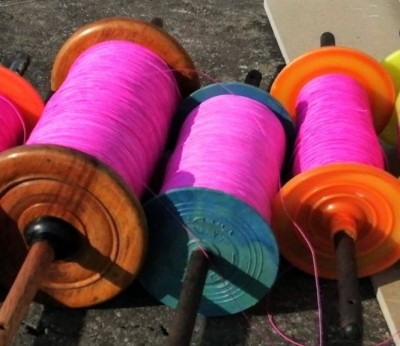
New Delhi, The Chinese manjha has once again decimated the life of a family in the national capital after a 34-year-old man, on way to his in-laws house to celebrate Rakhi died after his throat was slit by a Chinese manjha.
The incident occurred on Thursday.
The police said the man, identified as Vipin Kumar, a resident of Rajdhani Park, Mundka, was travelling with his wife and daughter on a motorcycle.
"He was going to his in-laws house in Loni, Uttar Pradesh from his house. As he reached Shastri Park Flyover on the ISBT- Seelampur carriageway, a Chinese manjha stuck in his neck and he got injured," a senior Delhi Police official said.
Fortunately an ambulance was passing from there at the same time which then immediately rushed the injured Vipin to Trauma Centre, however, he succumbed to the injury midway and was declared brought dead to the hospital.
The police have registered an FIR under sections 304A and 188 of the Indian Penal Code in the matter.
The problem is not with the tradition of kite flying but the thread, popularly known as Chinese manjha.
The manufacturers of the Chinese manjha use glass and metal powder coating over it which at times causes grievous and fatal injuries to humans and birds.
After much deliberations, the Delhi government had banned the sale, production, storage, supply, import, and use of kite flying thread made out of nylon, plastic or any other synthetic material and any other kite-flying thread that is sharp or made sharp such as by being laced with glass, metal or any other sharp materials in the National Capital Territory in 2017. However, even after five years of prohibition, the dangerous thread is still claiming lives of humans, birds and even animals.
But how is this thing killing people?
Kite flying is popular sport in Delhi and it catches pace weeks before, during and after the Independence Day celebrations in the month of August every year. The sport of kite flying is played between two people. The way to win the battle is by severing the kite thread of the rival. However, the severed thread plummets downwards often entangling between streets and roads causing injuries to an unsuspecting pedestrian or even death to a two-wheeler-borne person.
On July 26, a father lost his 30-year-old son, identified as Sumit Ranga, when the latter, riding on his motorcycle, got his throat slit with a Chinese Manjha on the Haiderpur Flyover in northwest Delhi. Sumit was rushed to the hospital, but it was too late for him.
This was not an isolated case but every year, deaths due to the kite strings are reported from several parts of the country. The number of incidents involving Chinese manjha is the highest in the last week of July and first half of August when kite flying happens the most.
The police in the national capital are presently on toes to avert such tragedies and are vigorously conducting raids to nab the suppliers of such kinds of strings.
"These banned kite flying threads are stronger due to coating of metallic powder but are very dangerous due to its innocuous nature which makes it easy for birds to get tangled in the string while flying or even sitting on trees," a senior Delhi Police official told IANS.
It is due to this sharp powdered metal coating, the Chinese manjha easily slices through flesh, leaving the humans, animals and birds gravely injured. "While there is a ban on all types of such manjha, many vendors still sell it. Most offenders get away as it is difficult to trace them," the senior official said.
In this regard, Assistant Commissioners of Police in several districts of Delhi have issued notifications with order that no person shall store, sell and use the special manjha with metallic powder or glass coating.
"It has become very difficult to find clues regarding culprits involved in selling of Chinese manjha because they take utmost care in this activity. It was found that they have adopted tactics to not sell it directly in the market to every customer but selling the same in discreet manner on demand by using codewords etc," the official said.
During continuous raids, the police found that wholesalers of Chinese manjha were receiving demands on telephone only from their identified retailers through codewords and were delivering the same by opening their locked godowns for a very short time preferably during the night hours.
Recently, a storage house full of Chinese manjha, having 205 cartons containing 11,760 rolls, was busted in northwest Delhi.
Apart from the northwest district, several people have been booked in other districts of the national capital along with recovery of large quantities of illegal strings.


.jpeg)

